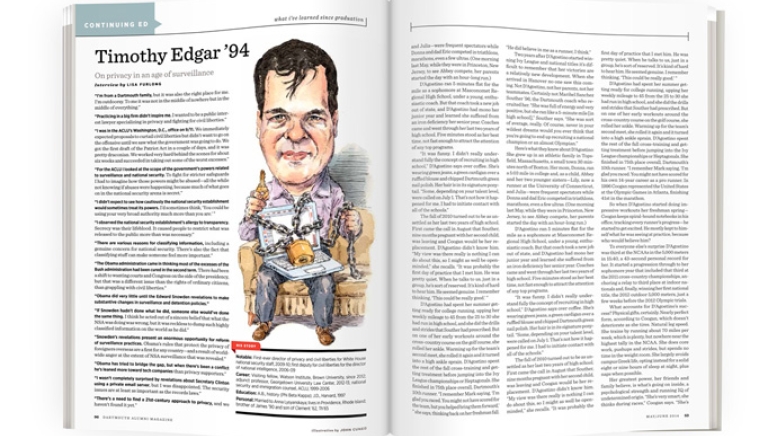Notable: First-ever director of privacy and civil liberties for White House national security staff, 2009-10; first deputy for civil liberties for the director of national intelligence, 2006-09
Career: Visiting fellow, Watson Institute, Brown University, since 2012; adjunct professor, Georgetown University Law Center, 2012-13; national security and immigration counsel, ACLU, 1999-2006
Education: A.B., history (Phi Beta Kappa); J.D., Harvard, 1997
Personal: Married to Anna Lysyanskaya; lives in Providence, Rhode Island; brother of James ’90 and son of Clement ’62, Th’65
“I’m from a Dartmouth family, but it was also the right place for me. I’m outdoorsy. To me it was not in the middle of nowhere but in the middle of everything.”
“Practicing in a big firm didn’t inspire me. I wanted to be a public interest lawyer specializing in privacy and fighting for civil liberties.”
“I was in the ACLU’s Washington, D.C., office on 9/11. We immediately expected proposals to curtail civil liberties but didn’t want to go on the offensive until we saw what the government was going to do. We got the first draft of the Patriot Act in a couple of days, and it was pretty draconian. We worked very hard behind the scenes for about six weeks and succeeded in taking out some of the worst excesses.”
“For the ACLU I looked at the scope of the government’s powers related to surveillance and national security. To fight for stricter safeguards I had to imagine how those powers might be abused—all the while not knowing if abuses were happening, because much of what goes on in the national security arena is secret.”
“I didn’t expect to see how cautiously the national security establishment would sometimes treat its powers. I’d sometimes think, ‘You could be using your very broad authority much more than you are.’ ”
“I observed the national security establishment’s allergy to transparency. Secrecy was their lifeblood. It caused people to restrict what was released to the public more than was necessary.”
“There are various reasons for classifying information, including a genuine concern for national security. There’s also the fact that classifying stuff can make someone feel more important.”
“The Obama administration came in thinking most of the excesses of the Bush administration had been cured in the second term. There had been a shift to wanting courts and Congress on the side of the presidency, but that was a different issue than the rights of ordinary citizens, than grappling with civil liberties.”
“Obama did very little until the Edward Snowden revelations to make substantive changes in surveillance and detention policies.”
“If Snowden hadn’t done what he did, someone else would’ve done the same thing. I think he acted out of a sincere belief that what the NSA was doing was wrong, but it was reckless to dump such highly classified information on the world as he did.”
“Snowden’s revelations present an enormous opportunity for reform of surveillance practices. Obama’s rules that protect the privacy of foreigners overseas are a first for any country—and a result of worldwide anger at the extent of NSA surveillance that was revealed.”
“Obama has tried to bridge the gap, but when there’s been a conflict he’s leaned more toward tech companies than privacy supporters.”
“I wasn’t completely surprised by revelations about Secretary Clinton using a private email server, but I was disappointed. The security issues are at least as important as the records laws.”
“There’s a need to find a 21st-century approach to privacy, and we haven’t found it yet.”




